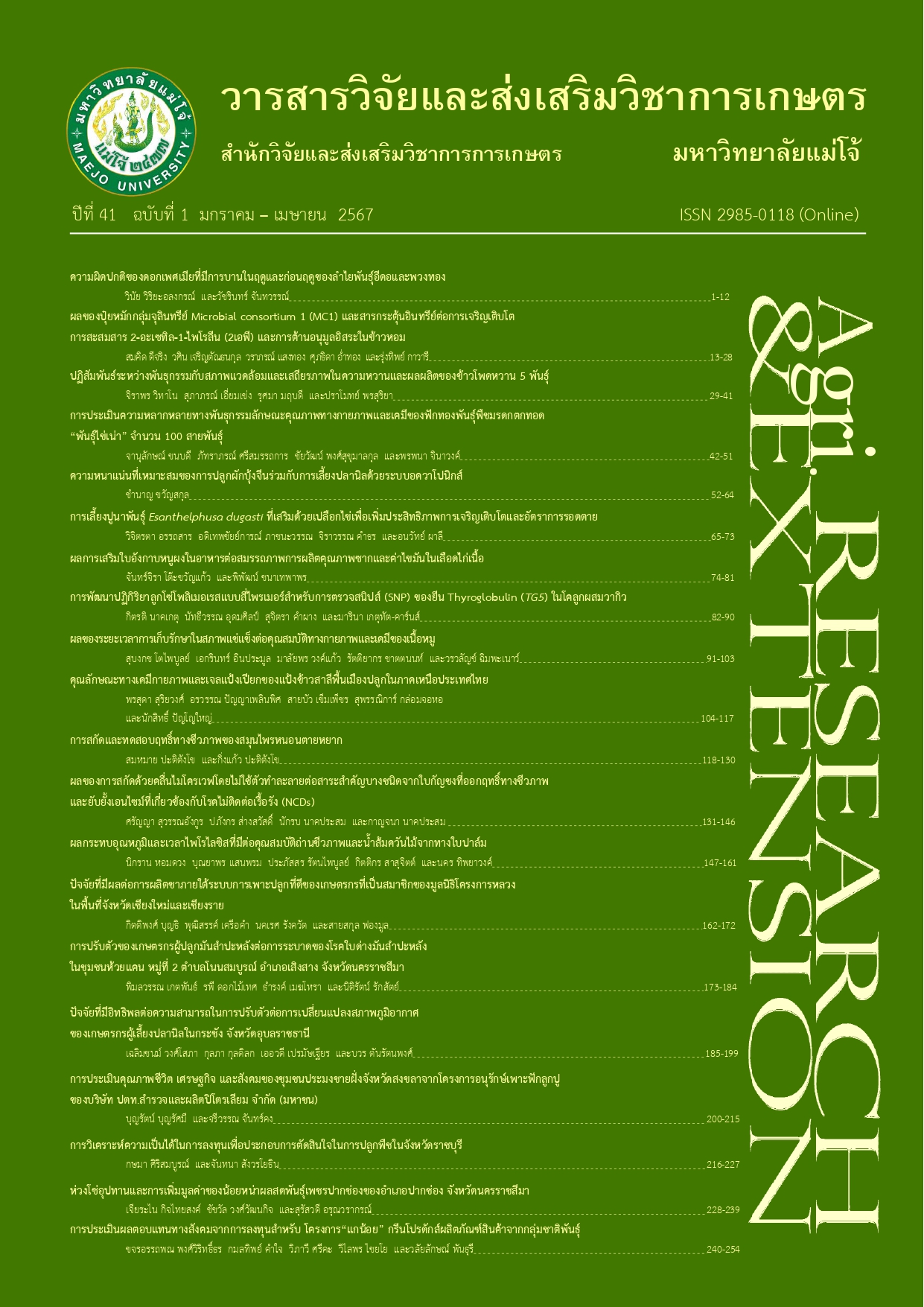การประเมินผลตอบแทนทางสังคมจากการลงทุนสำหรับ โครงการ“แกน้อย” กรีนโปรดักส์ผลิตภัณฑ์สินค้าจากกลุ่มชาติพันธุ์
DOI:
https://doi.org/10.14456/jare-mju.2024.20คำสำคัญ:
ผลตอบแทนทางสังคม , กลุ่มชาติพันธุ์บทคัดย่อ
การศึกษาครั้งนี้มีวัตถุประสงค์เพื่อการประเมินผลตอบแทนทางสังคมจากการลงทุนสำหรับโครงการ “แกน้อย” กรีนโปรดักส์ ผลิตภัณฑ์สินค้าจากกลุ่มชาติพันธุ์ การกำหนดขนาดกลุ่มตัวอย่างโดยใช้วิธีการเลือกตัวอย่างแบบไม่ใช้ความน่าจะเป็น โดยเริ่มต้นด้วยเทคนิคการกำหนดระบบโควตา จำนวน 60 คน ใช้เทคนิคสุ่มเลือกกลุ่มตัวอย่างโดยใช้ความสะดวกและวิธีการเลือกแบบเจาะจง โดยต้องสมัครใจในการให้ข้อมูลและเข้าร่วมโครงการ โดยการวิเคราะห์แผนที่ผลลัพธ์ ประกอบด้วย ปัจจัยนำเข้า กิจกรรม ผลผลิต และการหาข้อสรุปเป็นผลลัพธ์การวิเคราะห์ข้อมูลผลลัพธ์ส่วนเกินโดยให้ค่านวณน้ำหนักการเปลี่ยนแปลงของกิจกรรมที่เกิดขึ้น (Deadweight) ปัจจัยสนับสนุนอื่นที่มีผลกระทบต่อผลสัมฤทธิ์ (Attribution) และอัตราการลดลงหรือคงที่ของผลสัมฤทธิ์ (Drop-off) แล้วหามูลค่าตัวแทนทางการเงิน (Financial proxy) ของผลลัพธ์ที่แท้จริง เพื่อคำนวณอัตราส่วนผลตอบแทนทางสังคมจากการลงทุน (SROI) ผลการศึกษาจำแนกเป็นสองด้าน พบว่า (1) ด้านเศรษฐกิจ ได้แก่ รายได้จากการประกอบอาชีพเกษตรกรรม รายได้จากการแปรรูปผลิตภัณฑ์ผลผลิตการเกษตร และลดค่าใช้จ่ายด้านสังคม ค่าใช้จ่ายของครอบครัวลงทุนในการเกษตร ลดหนี้สินครัวเรือนจากการวางแผนการผลิตรอบปีผลผลิตการเกษตร (2) ด้านสังคมการศึกษา ได้แก่ การมีวิชาชีพและความรู้ในการทำผลิตภัณฑ์แปรรูป และการแปรรูปผลผลิตทางการเกษตร สังคมวัฒนธรรม ซึ่งผลตอบแทนทางสังคมจากการลงทุน (SROI) ของโครงการฯ มูลค่าการลงทุนตามกลุ่มผู้มีส่วนได้ส่วนเสีย จำนวน 2,388,913.04 บาท กับมูลค่าผลลัพธ์ตามกลุ่มผู้มีส่วนได้ส่วนเสีย 2,565,869.57 บาท มูลค่าผลลัพธ์การลงทุนทั้งสิ้น 2,436,050.29 บาท มูลค่าผลลัพธ์สุทธิ (SROI) 176,956.53 บาท ทั้งนี้ทุก 1 บาท ที่ลงทุนในโครงการฯ สามารถสร้างประโยชน์ทางสังคมด้วยมูลค่า 1.07 บาท สรุปได้ว่า โครงการฯ สร้างคุณค่า ที่เป็นประโยชน์ต่อสังคม และมีความคุ้มค่าต่อการลงทุนในงบประมาณที่ดำเนินการ
เอกสารอ้างอิง
Cambero, C. and T. Sowlati. 2014. Assessment and optimization of forest biomass supply chains from economic, social and environmental perspectives-a review of literature. Renewable and Sustainable Energy Reviews 36(1): 62-73.
Committee on Agriculture and Cooperatives. 2021. Impacts on the Thai Economy from Coronavirus Disease (COVID-19) and Recommendations for Driving the Development of the Agricultural Sector under the National Strategic Plan According to the Situation. Bangkok: Secretariat of the Senate. 15 p.
Eccles, R.G., and M. Krzus, 2010. One Report: Integrated Reporting for a Sustainable Strategy. New York: John Wiley and Sons, Inc. 256 p.
Joyce, S.A., and M. MacFarlane. 2001. Social Impact Assessment in the Mining Industry: Current Situation and Future Directions. London: Mining, Minerals and Sustainable Development. 28 p.
Kae Noi Royal Project Cooperative. 2020. Annual Report Year 2020. Chiang Mai: Kae Noi Royal Project Cooperative. 43 p. [in Thai]
National Innovation Agency, Thailand. 2020. SROI CALCULATOR. [Online]. Available https://sroi-calculator.nia.or.th (October 25, 2022).
Pongwiritthon K., K. Kamchai and W. Panturee 2022. Social return on investment assessment from operations of community-based innovation and career development fund: information dystems for managing community financial institutions. Res Militaris 12(2): 1174-1184.
Schlten, P., J. Nicholls, S. Olsen and B. Galimidi. 2006. Social Return on Investment: A Guide to SROI Analysis. Amstele Veen: Lenthe publishers. 118 p.
Vallaeys, F. 2014. University Social Responsibility: A Mature and Responsible Definition. pp. 88-96. In GUNI Report 2014 nº5 Higher Education in The World. Springfield: Global University.
ดาวน์โหลด
เผยแพร่แล้ว
รูปแบบการอ้างอิง
ฉบับ
ประเภทบทความ
สัญญาอนุญาต
ลิขสิทธิ์ (c) 2024 วารสารวิจัยและส่งเสริมวิชาการเกษตร

อนุญาตภายใต้เงื่อนไข Creative Commons Attribution-NonCommercial-NoDerivatives 4.0 International License.
บทความนี้ได้รับการเผยแพร่ภายใต้สัญญาอนุญาต Creative Commons Attribution-NonCommercial-NoDerivatives 4.0 International (CC BY-NC-ND 4.0) ซึ่งอนุญาตให้ผู้อื่นสามารถแชร์บทความได้โดยให้เครดิตผู้เขียนและห้ามนำไปใช้เพื่อการค้าหรือดัดแปลง หากต้องการใช้งานซ้ำในลักษณะอื่น ๆ หรือการเผยแพร่ซ้ำ จำเป็นต้องได้รับอนุญาตจากวารสาร





